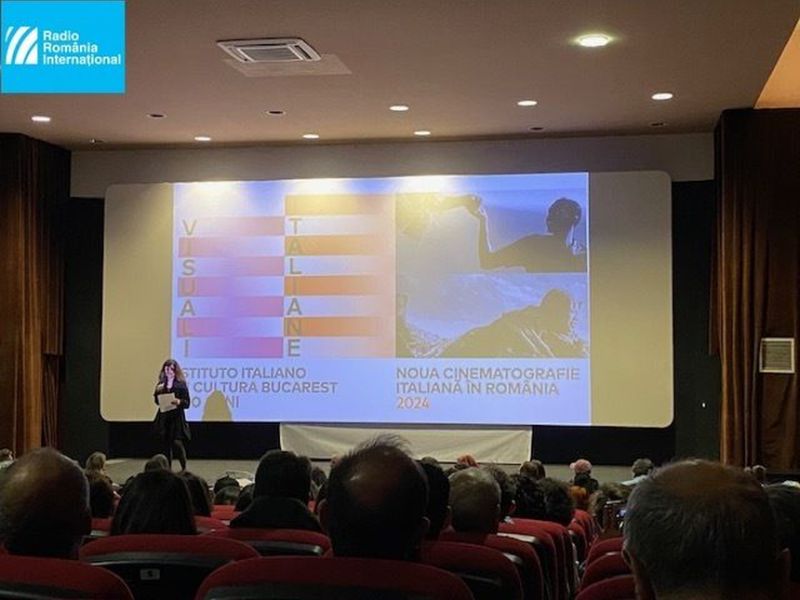Ruxandra Cesereanu: poetry as an existential calling
A well-known poet and prose and essay writer in Romania, Ruxandra Cesereanu recently published a new book of poems entitled “California (on Somes River) at the Charmides publishing house.

Corina Sabău, 25.07.2015, 14:22
A well-known poet and prose and essay writer in Romania, Ruxandra Cesereanu recently published a new book of poems entitled “California (on Somes River) at the Charmides publishing house. In a review carried by the Observatorul Cultural magazine, critic Adina Dinitoiu describes the book as “a powerful and well built volume, perhaps the best from Ruxandra Cesereanu so far. Standing apart from the sensorial and sensual poetic imagery we find in her previous work, this new collection of poetry explores for the first time the initiation and ecstatic state of poetry and a conscious intention to affirm the poets trust in poetry. Referring to the title of the book, Cesereanu says the initial title also included the word “hotel, which she gave up at the last minute because it would have restricted the world created by her book, a book about childhood, teenage years, youth and maturity.
Ruxandra Cesereanu: “This book of poems was not the result of a clearly defined project, but was a process, an alluvial movement that became more definite as it grew. At first I thought I was going to write a 5-page long poem that was to be structured into three layers: a realist visual layer given by the landscape on the bank of the Somes river, a layer given by the faith in poetry and metapoetry and a layer of recollections. I never imaged that it would grow so much, as it was meant to be a very concentrated poem. At some point, however, I realised these different layers were very complex and that they caused a sort of explosion and implosion at the same time, which triggered a landslide. Like in a landslide, things started rolling down, and I alone could halt their movement. My initial title, ‘California Hotel on Somes was inspired by the famous song by the Eagles, and for a five-page poem, it would have been sufficient. However, when the poem grew and multiplied, it was like a river with its own layers, different depths and different courses and I realised that the word ‘hotel with its spatial, albeit poetic, implication, was too restrictive and did not reveal the flow I was experiencing.
In 2013, Ruxandra Cesereanu bought a bicycle and started making bike trips along the Somer River. One day, as she was on her way home after cycling up and down the river, she heard the sound of a guitar and some distant voices. They came from a group of boys and girls playing Hotel California by the Eagles. Their more or less accurate rendition and their voices reminded Cesereanu of her teenage years when she also used to play the song with her high school and later her university friends, on those very banks of the river or at different parties.
“This going back in time is what triggered the poem and the whole book made up of one poem with different layers, explains Ruxandra Cesereanu: “Im having a strange experience, strange in a good way, that gives me energy and an added pleasure for life, a kind of ultralife, as I call it. Its clear to me now that this book has a life of its own and will continue to grow. I think the existing layers will engender new layers, especially during my summer holidays when I experience a kind of Proustian process in which the layers of memories or the metapoetic layers are in their most concentrated form. Im sure this book will grow in time, but it will remain a personal experience, because I have no plans to publish the new poems. I have already published a special edition of the book containing 17 extra poems, so everything I write from now on on this subject will be an exclusively personal project.
“California (on Somes River) has been described by critics as a book about poetry as a vocation and about the existential trust in poetry. In fact, the book contains a series of literary references that are essential to Ruxandra Cesereanus work: “I personally came up in an environment in which poetry had a high aesthetic standard. My father read poetry to me as a teenager. When I was about 17 or 18 he brought me the poetry of the 80s generation, this is how I started reading and commenting poetry, with him, and went on to read with him the great poetry of the world. Somehow, I grew up with the idea that poetry is a pinnacle. But I didnt know back then that poetry would become supreme for me. Of course, today we are trying to avoid pathetic wording, because we live in a society that is somewhat disenchanted and post-postmodernist, which no longer wants to be cantered on archetypes. I, however, am adapted to this postmodernist society, but I hold on to my beliefs of old, which have synthesized since then, because now I am at the age of maturity. Poetry for me, therefore, is a form of redemption, redemption at the vital level. I believe in poetry, I lead a battle for poetry, because for me it is the supreme art, maybe the only type of literature that I can compare with symphonic music. And when I talk about poetry I dont mean versification, but verses in an advanced aesthetic form. Thats what I mean when I say that I am in a battle for poetry. I do believe that in our disenchanted world there are still some solutions for enchanting through storytelling, because the world can be saved through stories, through poetry and the belief in a given poem. I no longer believe that the world can be saved by a poetry of the trivial, but neither can it be saved by a poetry of sentimentalism, of the diaphanously pathetic. There is, however, what I call poetry mixed with meta-poetry, in which belief in literature becomes a way of life.
Ruxandra Cesereanu has published several volumes in English translation, such as “Schizoid Ocean, a volume of poetry from 1997, a volume of essays called “Political Torture in the 20th century, in 2006, and two more volumes of poetry, “Crusader Woman and “Forgiven Submarine. She has been awarded several pages in the “Whos Who in Contemporary Womens Writing.





























